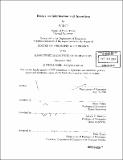| dc.contributor.advisor | Glenn Ellison and Abhijit V. Banerjee. | en_US |
| dc.contributor.author | Li, Wei, 1975- | en_US |
| dc.contributor.other | Massachusetts Institute of Technology. Dept. of Economics. | en_US |
| dc.date.accessioned | 2005-06-02T16:26:54Z | |
| dc.date.available | 2005-06-02T16:26:54Z | |
| dc.date.copyright | 2003 | en_US |
| dc.date.issued | 2003 | en_US |
| dc.identifier.uri | http://hdl.handle.net/1721.1/17624 | |
| dc.description | Thesis (Ph. D.)--Massachusetts Institute of Technology, Dept. of Economics, 2003. | en_US |
| dc.description | Includes bibliographical references (p. 145-148). | en_US |
| dc.description.abstract | The first chapter of this thesis analyzes how the gossip process can be manipulated by malicious people and the impact of such manipulation on information transmission. In this model, a single piece of information is transmitted via a chain of agents with privately known types. Each agent may be either objective or malicious, with the latter type aiming to bias the information transmitted. In an indirect-impact gossip model where agents aim to influence a final decisionmaker, the malicious type's equilibrium incentive to make up wrong information is independent of their position in the gossip chain. Moreover, adding just a few malicious people to the population sharply decreases the amount of information transmitted. In a direct-impact gossip model where every malicious agent is concerned about influencing the immediate listener, gossip causes initial contamination of data, but eventually dies out as the objective people stop listening. The second chapter is joint with Botond Koszegi, in which we consider a career concerns model in which an agent's productivity has two components: talent and responsiveness to incentives. We use the term "drive" to reflect people's different responsiveness to incentives, and show that the extra dimension of heterogeneity changes the behavior of agents and the structure of organizations in significant ways. First, since agents more responsive to incentives are expected to work harder-and therefore be paid more-than less driven ones, everyone might be induced to work hard to signal that they are driven. Over a long horizon, these "drive-signaling incentives" have a tendency to bootstrap themselves, and, if this effect is strong enough, to create significant incentives with little else motivating the agent. On the other hand, signaling one's drive can be detrimental, because past outputs will be taken by the principal to reflect lower ability. Thus, drive-signaling incentives are likely to increase effort early in the career and decrease it later. We discuss in detail a consequence of our framework for organizational design. To maximize effort, the principal wants to observe a measure of the agent's effort (say, his hours worked) early, but not late, in the career. | en_US |
| dc.description.abstract | (cont.) The third chapter models how people's improving ability to observe the state of the world interacts with their incentive to reveal their information truthfully. A principal makes a decision based on a sequence of reports from an agent with reputational concerns. Agents with privately known ability receive signals of different initial quality, as well as varying speed of quality improvement. Thus both the accuracy and the sequencing of the reports affect the principal's perception of the agent's ability. This paper has three main findings. First, in equilibrium, mind changes or inconsistent reports may be more valued by the market as a sign of talent and fast improvement, yet mediocre agents still repeat their early opinion more frequently because they have less relative confidence in their signal quality improvement. Second, sequential reporting can be superior to a final reporting system ... | en_US |
| dc.description.statementofresponsibility | by Wei Li. | en_US |
| dc.format.extent | 148 p. | en_US |
| dc.format.extent | 6577559 bytes | |
| dc.format.extent | 6577364 bytes | |
| dc.format.mimetype | application/pdf | |
| dc.format.mimetype | application/pdf | |
| dc.language.iso | eng | en_US |
| dc.publisher | Massachusetts Institute of Technology | en_US |
| dc.rights | M.I.T. theses are protected by copyright. They may be viewed from this source for any purpose, but reproduction or distribution in any format is prohibited without written permission. See provided URL for inquiries about permission. | en_US |
| dc.rights.uri | http://dspace.mit.edu/handle/1721.1/7582 | |
| dc.subject | Economics. | en_US |
| dc.title | Essays on information and incentives | en_US |
| dc.type | Thesis | en_US |
| dc.description.degree | Ph.D. | en_US |
| dc.contributor.department | Massachusetts Institute of Technology. Department of Economics | |
| dc.identifier.oclc | 54770414 | en_US |
